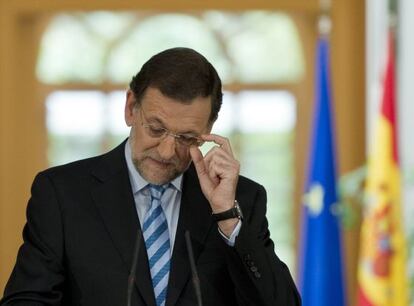Spain’s bank bailout: Prime Minister Rajoy takes the credit
EU rescue package to total 100 billion euros to clean up country’s financial sector Rajoy denies pressure to accept loan; argues move is a triumph for the euro zone

After being widely criticized for failing to appear in public on the day that Spain accepted a European Union bailout for its debt-ridden banking sector, Prime Minister Mariano Rajoy improvised a brief press conference on Sunday to explain the financial rescue package before flying off to Poland for the Euro 2012 soccer match between Spain and Italy.
In his first solo address to the media since he was elected last November, the always-cautious Popular Party (PP) leader took care to avoid using the word bailout, and instead talked about “a loan” and even “yesterday’s event” to describe the agreement with the Eurogroup of financial ministers to prepare a bailout to clean up Spain’s financial sector.
Rajoy stated that his government’s strategy has been to avoid “semantic debates” as to the nature of any eventual assistance at all times.
For his part, Economy Minister Luis De Guindos has called the up to 100-billion-euro loan “financial help.”
Rajoy, who was elected on the promise that he would reduce the country’s risk premium, create jobs and above all restore investor confidence in Spain, has finally had to request a bank loan that he tried desperately to avoid.
But on Sunday the conservative leader turned the criticism on its head and claimed that this situation is exactly what he had been seeking personally for weeks, although until now he had been saying the contrary “out of discretion.”
If we hadn’t done our homework, Spain would have needed an intervention"
Up until Friday, his government had been asserting that a bailout of Spain’s banking sector was “unthinkable.” Less than two weeks ago, Rajoy himself stated that “there will be no bailout of Spanish banks.” At one point, he even discredited a suggestion by French President François Hollande to the effect that Spain should go ahead and request a bank bailout.
Rajoy’s central message was that the PP’s reforms to date have allowed Spain to avoid a real, full-blown bailout such as those experienced in Greece, Portugal and Ireland. Rajoy also insisted that it was not Europe who pressured him into taking the money, but rather he himself who pressured the EU into lending it. The decision to request the money, in his opinion, “sends out a clear message: the euro is an irreversible project, it is very good for Europe and it is very good for Spain. [...] It was not easy, but Europe rose to the circumstances and that is a very comforting thing.”
Asked by reporters why Spain did not request this money earlier if it was such a good idea, Rajoy quipped: “That’s what I’d like to know.”
“If we hadn’t done our homework, what would have been on the table yesterday is the intervention of the Kingdom of Spain, instead of a credit line,” he said. “The winners yesterday were the credibility of the European project, the future of the euro and the solidity of the financial system to get credit flowing again.”
“Yesterday’s event is part of a plan to restructure the Spanish economy and fine-tune it,” he added. “Without credit there is no investment, and without investment there is no growth.”
According to Rajoy, “nobody has pressured me; I’m the one who pressured because I wanted a credit line.”
The PP leader said that “this should have been done three years ago,” in a clear criticism of the previous Socialist administration. He also claimed that the decision “will not affect the deficit.”
However, Economy Minister Luis de Guindos said that the package could indeed affect the deficit because the loan’s interest counts as deficit. De Guindos also said that Spanish debt would grow considerably with this solution.
The prime minister justified his plans to attend the European Cup match in Poland, saying that the situation in Spain is resolved, that the Spanish national team “deserves” for him to be there, and because his presence there will be a good thing overall. In any case, if the situation had not been resolved “it is obvious” that he would not go, he added.
“I’m leaving at two in the afternoon. I am flying back in the evening and tomorrow morning I will be there at the swearing-in of the governor of the Bank of Spain.”
Tu suscripción se está usando en otro dispositivo
¿Quieres añadir otro usuario a tu suscripción?
Si continúas leyendo en este dispositivo, no se podrá leer en el otro.
FlechaTu suscripción se está usando en otro dispositivo y solo puedes acceder a EL PAÍS desde un dispositivo a la vez.
Si quieres compartir tu cuenta, cambia tu suscripción a la modalidad Premium, así podrás añadir otro usuario. Cada uno accederá con su propia cuenta de email, lo que os permitirá personalizar vuestra experiencia en EL PAÍS.
¿Tienes una suscripción de empresa? Accede aquí para contratar más cuentas.
En el caso de no saber quién está usando tu cuenta, te recomendamos cambiar tu contraseña aquí.
Si decides continuar compartiendo tu cuenta, este mensaje se mostrará en tu dispositivo y en el de la otra persona que está usando tu cuenta de forma indefinida, afectando a tu experiencia de lectura. Puedes consultar aquí los términos y condiciones de la suscripción digital.








































